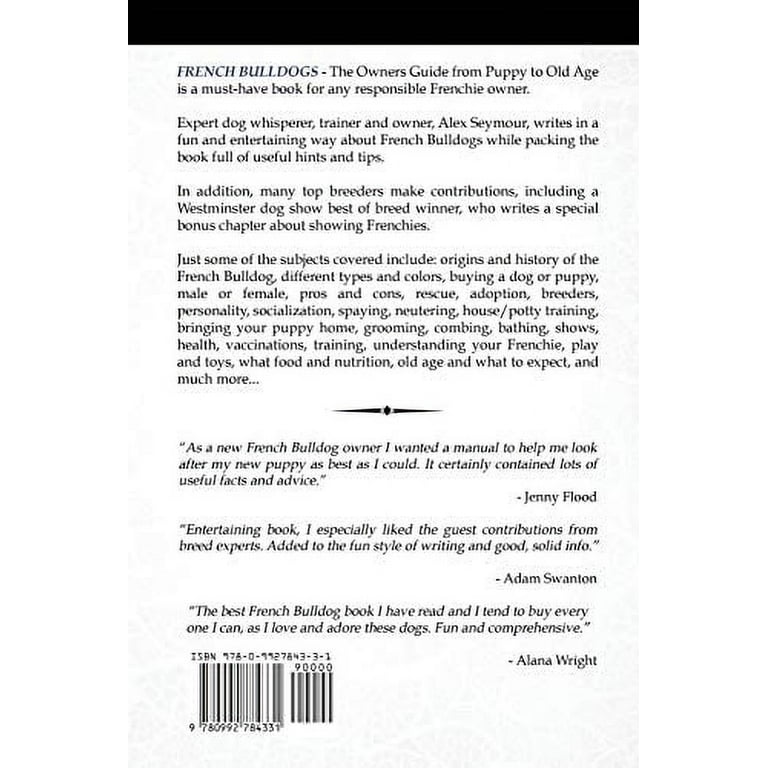Contents
The Mini French Bulldog Guide is a small, affectionate breed, perfect for apartment living and families. With a friendly demeanor and low exercise needs, they make ideal companions for various lifestyles.
It’s important to provide proper care, training, and socialization for a happy and healthy pet. Make sure to consult with a veterinarian for regular check-ups and vaccinations. Additionally, monitoring their diet, exercise, and grooming needs will ensure a well-balanced lifestyle.
Understanding the breed’s characteristics and temperament is key to forming a strong bond with your Mini French Bulldog. By investing time and effort into their well-being, you can enjoy a fulfilling companionship for many years to come.

Credit: www.walmart.com
The Mini French Bulldog Breed
The Mini French Bulldog breed is known for its charming, playful nature and small yet sturdy build. Despite their compact size, these dogs are energetic and love human companionship. With their distinctive bat ears and affectionate demeanor, Mini French Bulldogs make wonderful companions for individuals and families alike.
| Mini French Bulldog Guide |
| The Mini French Bulldog Breed |
| Origins and History |
| Mini French Bulldogs have a rich history traced back to France in the 1800s. |
| Originally bred as companion dogs, they are known for their affectionate nature. |
| Physical Characteristics |
| Mini Frenchies have a distinctive bat-like ears and a compact, muscular build. |
| They come in various colors like fawn, brindle, white, or a combination of these. |
Caring For Your Mini French Bulldog
Proper nutrition is essential for your Mini French Bulldog’s overall health and well-being. Ensure they have a balanced diet with high-quality protein. Regular exercise and playtime are crucial to keep your Mini Frenchie happy and healthy. Engage them in interactive play sessions daily.
Grooming your Mini French Bulldog is important to prevent skin issues and maintain their coat. Regularly brush their coat and clean their facial wrinkles to avoid infections.
Training Your Mini French Bulldog
Training your mini French Bulldog is essential for ensuring a well-behaved and happy pet. Basic obedience training is the foundation for a well-behaved dog. Focus on commands such as sit, stay, and come, using positive reinforcement techniques. Socialization tips are crucial for your mini French Bulldog’s development. Expose your pup to various environments, people, and animals in a positive and controlled manner. Consistent and patient house training is also necessary. Use a designated potty area and establish a routine for regular bathroom breaks. With dedication and positive reinforcement, your mini French Bulldog can become a well-trained and well-adjusted companion.

Credit: www.walmart.com
Health Considerations
When it comes to the health of your mini French Bulldog, it is important to be aware of common health issues that these adorable pets may face. Regular veterinary care is essential in ensuring their well-being and preventing the development of any potential health problems.
Some of the most common health issues in mini French Bulldogs include:
- Respiratory problems: Their short snouts can make it difficult for them to breathe properly.
- Skin allergies: Mini French Bulldogs are prone to skin allergies, which may result in itching and redness.
- Eye problems: Their prominent eyes can be prone to various eye conditions such as dryness or infections.
- Joint and bone problems: Due to their compact size and muscular build, mini French Bulldogs may be susceptible to joint and bone issues like hip dysplasia.
To ensure the health and happiness of your mini French Bulldog, it is important to provide them with regular veterinary check-ups and seek immediate medical attention if any symptoms or concerns arise. Additionally, proper nutrition, exercise, and a safe environment can also contribute to their overall well-being.
The Mini French Bulldog As A Companion
Creating a safe environment for your mini French Bulldog is crucial for both bonding and interaction. Start by puppy-proofing your home, removing any potential hazards such as toxic plants, small objects, and cables. Provide a designated area with a comfortable bed, toys, and access to fresh water. It’s important to establish a routine for meal times, potty breaks, and play sessions to help your Frenchie feel secure and confident in their surroundings.
Encourage positive interactions by using rewards, such as treats and praise, when they exhibit desired behaviors. Gradually introduce your Frenchie to new experiences, environments, and people to help socialize them effectively. Always supervise their interactions with other pets and children, ensuring that they are respectful and gentle. Building a safe environment will foster a strong bond and healthy interaction between you and your mini French Bulldog.

Credit: www.amazon.com
Frequently Asked Questions On Mini French Bulldog Guide
What Is A Mini French Bulldog?
A Mini French Bulldog is a smaller version of the regular French Bulldog breed. They have the same distinctive appearance and personality as their larger counterparts, but are bred to be smaller in size.
How Big Do Mini French Bulldogs Get?
Mini French Bulldogs usually weigh between 16-28 pounds and stand around 11-12 inches tall at the shoulder. They are compact and sturdy dogs, but smaller than the standard French Bulldog breed.
Are Mini French Bulldogs Good With Kids?
Yes, Mini French Bulldogs can be great companions for kids. They are known for their affectionate and friendly nature, making them well-suited for families with children. However, it is important to supervise interactions to ensure safety for both the dog and the child.
Do Mini French Bulldogs Require A Lot Of Exercise?
Mini French Bulldogs do not require extensive exercise due to their smaller size and lower energy levels. Short walks and some playtime indoors or in a fenced yard are usually enough to keep them happy and healthy. However, regular exercise is still important to prevent obesity.
Conclusion
Mini French Bulldogs make wonderful pets with their unique charm and playful nature. Their small size makes them well-suited for apartment living, and their loyal and affectionate personalities endear them to their owners. With proper care and attention, these adorable companions will bring joy and love to any household.


